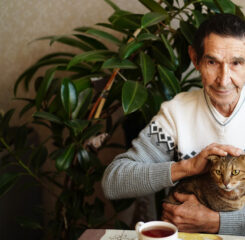Report Sheds Light on House HUD Funding Bill
On July 15, the House Appropriations Committee released the report to its fiscal year 2022 HUD appropriations bill. The report is a plain-language document that informs HUD of the story behind legislative language in the appropriations bill itself. The report explains, often in much greater detail than the bill itself does, the Committee’s requests and directives to HUD for the next fiscal year. The Senate Appropriations Committee will also issue a report to complement its forthcoming FY22 HUD appropriations bill and the two will be reconciled prior to a final FY22 bill being enacted later this year.
For now, it is very helpful to see what issues the House’s report raises and what the report directs HUD to do about those issues.
New Section 202 Supportive Housing for the Elderly
In the report, the Committee provide clarity on the amount of funds from the bill dedicated to new Section 202 homes. In total, the bill provides $205 million for approximately 2,250 new Section 202 homes. In FY21, Congress provided $52 million for new Section 202 homes. Expanding the supply of affordable senior housing is LeadingAge’s top housing policy priority.
The report admonishes HUD for not releasing all appropriated funding for new Section 202 housing more expeditiously, a complaint shared by LeadingAge. “From fiscal years 2018–2021, the Committee provided a total of $298,000,000 in funds for new construction. To date, the Department has only awarded a total of $51,647,750 for 18 awards to create an estimated 1,100 units for very low-income seniors, and a significant portion of funds have yet to be made available. The Committee directs the Department to make all remaining funding provided in fiscal years 2018, 2019, 2020, and 2021 available within 60 days of enactment of this Act, and to award that funding within 180 days of enactment of this Act,” the report says.
The Committee also urges HUD make HUD-assisted properties more energy efficient and more resilient to extreme weather events. The bill, the report says, allows the HUD Secretary to give preference to projects that promote water and energy efficiency or seek to increase resilience to natural hazards
Of the $205 million for new Section 202 housing, up to $10 million is for intergenerational housing. “The Committee recognizes the critical need to provide housing opportunities for grandparents raising grandchildren in high poverty urban and rural areas. This need has only increased due to the opioid crisis,” the report says.
Service Coordinators
The report makes clear that the bill would fund new Service Coordinators through two HUD accounts in FY22: $30 million for new budget-based Service Coordinators of the $14.4 billion the bill provides for the Project-Based Rental Assistance Account and some number of new grant-based Service Coordinators after contracts for existing Service Coordinators are renewed with the $125 million provided by the bill within the Section 202 account.
Project-Based Contract Administrators
In the report, House appropriators draw a direct line between the lack of management and occupancy reviews between 2011 and 2016, when HUD suspended MORs because of litigation, and “the physical deterioration of some properties and put the health and safety of residents at risk.” The report urges HUD to implement a new competition and award procedure for PBCAs quickly.
Quality Assurance of Physical Inspections
The report describes at length how the Committee is “is troubled by reports of deplorable living conditions found in some HUD-subsidized properties across the country.” In the report, the Committee encourages HUD to work with the Committee on enforcement actions, including civil monetary penalties, that HUD can take to ensure landlords and public housing agencies “maintain the physical quality and safety of HUD-assisted units.” The report also directs HUD to provide a report to the Committee identifying how HUD is improving the inspection process and related protocols, including quality assurance of inspections, identified actions yet to be implemented, the status of actions undertaken, and a timeline for completion of all actions.
Fire Safety
While the fire safety language in the report is only within the public housing program account, it is this type of language that can quicky become applicable across all program types. For this reason, it is interesting to note that, for public housing, the bill provides funding for the installation of automatic sprinkler systems in public housing despite the fact that the Federal Fire Safety Act of 1992 did not mandate that such systems be installed in public housing built prior to 1992.
Section 811 Services and Service Coordinators
For HUD’s Section 811 Housing for Persons with Disabilities program, the report explains the House’s desire to put a new tool in place to fund supportive services in Section 811 communities. If enacted, the House report language would allow excess residual receipts to be used to pay for supportive services, including a Service Coordinator, not currently covered by HUD or other governmental agencies in an area for which a Section 811 household resides. The report directs HUD to issue guidance to property owners on how they can work with local supportive service agencies to leverage services for residents. The Frank Melville Supportive Housing Investment Act of 2010 expanded HUD’s Service Coordinator program beyond senior housing to include Section 811 communities and allows 811/PRAC contract amounts to be increased when needed to pay for project costs, supportive services, and Service Coordinators.
Policy Development & Research
The report directs HUD’s Office of Policy Development & Research to undertake to studies of particular interest to affordable senior housing stakeholders.
First, because “the Committee recognizes that broadband infrastructure barriers and high monthly costs result in HUD-assisted households often receiving inadequate access to internet and capacity not provided through a personal cellular device,” is an analysis of the extent to which this problem exists. As part of this analysis, the Committee directs HUD to explore potential methods for providing high-quality, subsidized broadband to HUD-assisted households, including through the expansion of monthly utility subsidies to include broadband, and the cost for building such capacity.
Second, because “the Committee is concerned about the prospect of seniors not being able to afford roofing and housing rehabilitation, which could lead to unsafe living conditions that could lead to increased poverty for this vulnerable population,” the report directs HUD assess the estimated number of seniors that are unable to afford to have their homes reroofed and rehabilitated by geographical region.
Read the full report here.

Most Recommended
April 22, 2024
CMS Finalizes Nursing Home Minimum Staffing Standards
April 21, 2024
 Older Americans Month 2024: Suggested Schedule
Older Americans Month 2024: Suggested Schedule
April 24, 2024
 Salary Threshold for White Collar Overtime Exemptions Raised
Salary Threshold for White Collar Overtime Exemptions Raised
April 12, 2024
Improving Medicare Advantage
Recently Added
April 26, 2024
HUD Publishes Updated Flood Risk Rule
April 26, 2024
 Final Nursing Home Staffing Mandate: Analysis
Final Nursing Home Staffing Mandate: Analysis
April 25, 2024



